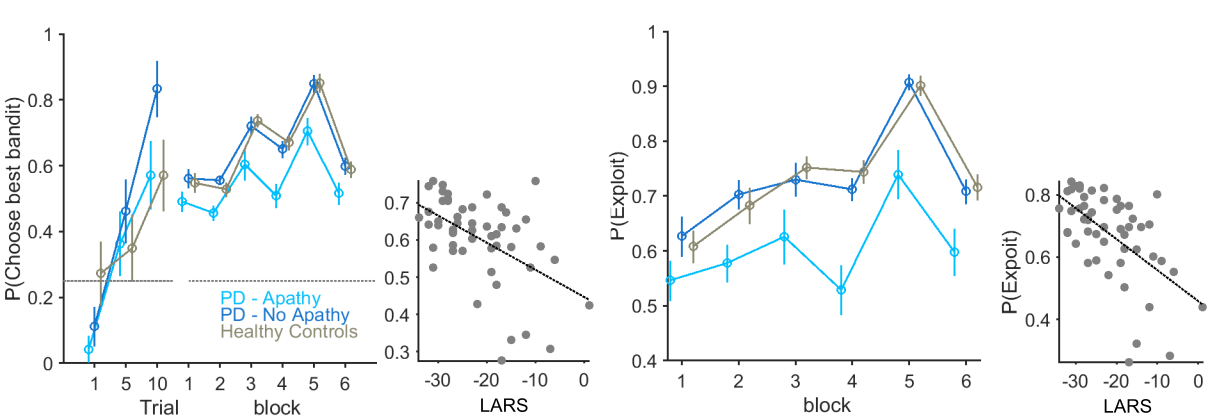Category: Parkinson's Disease: Cognitive functions
Objective: To investigate the neural basis of apathy in Parkinson’s Disease (PD).
Background: Apathy is a debilitating and poorly understood syndrome characterised by a reduction in goal-directed behaviour. Apathy affects 40% of patients with PD, but its underlying mechanisms are not well understood. The fronto-striatal circuit, which mediates motivated behaviour, including whether a behaviour was worth performing by outcome monitoring, may be dysfunctional in apathy patients but this has not been tested.
Method: We studied 77 subjects including PD patients with (n=25, Lille Apathy Rating Scale (LARS)>=-21) and without out apathy (n=30, LARS<-22), as well as age and sex- matched controls (n = 22) performing a 4-armed “restless” bandit reinforcement learning task.
We examined both model-free behavioural performance (decision time, missed trials, best bandit choice) and model-based behaviour. Model-based choices were categorised following fitting of behaviour to a reinforcement learning model with two learning rule variants (Temporal difference, Kalman Filter) and four variants of the SoftMax choice rule.
Results: There was no difference in decision time or the number of missed trials (p = 0.19, p = 0.13) between apathetic, non-apathetic PD patients or healthy controls. PD patients with apathy were less likely to choose the bandit with the highest pay-out (p<0.001) and apathy severity (LARS score) correlated with task performance (P<0.001). Computational modelling of choice behaviour revealed that PD apathy was associated with increased exploration of low value options and diminished exploitation of the highest valued bandit (p<0.001). Probability of exploring the lower value bandit correlated with individual LARS score (p<0.001).
Conclusion: We demonstrate that apathy in PD is associated with a failure to adequately monitor the outcome of rewarding actions. Functional imaging would be helpful to identify if this is associated with a dysfunction of the fronto-striatal circuit, particularly in identifying if this is driven by impaired encoding of value. In turn, this may identify a novel neural circuit of apathetic decision making in PD to guide targeted treatment approaches.
To cite this abstract in AMA style:
W. Gilmour, G. Mackenzie, M. Feile, A. Macleod, V. Marshall, D. Steele, T. Gilbertson. Failure of model-based outcome monitoring in Parkinson’s Disease Apathy [abstract]. Mov Disord. 2023; 38 (suppl 1). https://www.mdsabstracts.org/abstract/failure-of-model-based-outcome-monitoring-in-parkinsons-disease-apathy/. Accessed February 28, 2026.« Back to 2023 International Congress
MDS Abstracts - https://www.mdsabstracts.org/abstract/failure-of-model-based-outcome-monitoring-in-parkinsons-disease-apathy/

